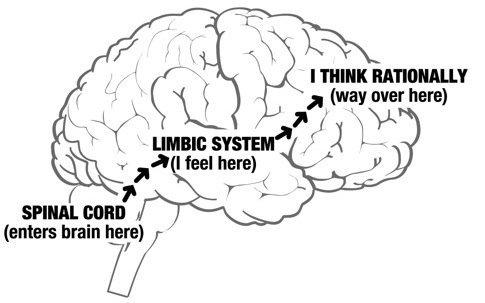Feelings and emotions make us human. Without them we would essentially be robots. However, even though feelings and emotions are integral parts of the human experience, they aren’t always valued.
We tell kids that it’s OK to feel their feelings. However, when they do, sometimes we invalidate their feelings by shaming them. Let’s take a look at the case example below.
Xavier’s Story
Ten year old Xavier and Mike are best friends. The boys are inseparable and do everything together. It came as no surprise that they wanted to be partners for a field trip to the zoo.
Before the trip, Xavier and Mike talk about all the cool things they were going to see and do. They especially couldn’t wait to see the gorillas! The boys make plans to sit with each other on the bus. “This is gonna be the best trip ever!” said Mike as he fist bumps Xavier.
However, on the day of the trip, Mike decides to sit with one of his other friends. Xavier is bummed out. He wonders if he did something to upset Mike. Mike reassures Xavier that everything is cool. He even promises that they’ll still hang out at the zoo.
When they arrive at the zoo, Xavier looks everywhere for Mike. He couldn’t find him anywhere. “Have you seen Mike?” Xavier asked his classmate Suri. “He went to go see the gorillas with his group,” answered Suri.
Xavier’s brain swirls with thoughts. We were supposed to go see the gorillas together! What a traitor. I thought we were best friends! His chest tightens and his heart is pounding. Xavier can feel his eyes burning with tears. He tries to wipe them away before anyone sees him crying.
Xavier ends up going to the exhibits with his teacher. He does his best to make the most of the trip. However, all he can think about is how Mike ditched him. I can’t believe he left me like that. Traitor.
When he sees Mike in the butterfly garden, Xavier walks up to him and intentionally bumps into him. Then he mutters “traitor” loud enough for Mike to hear.
After the trip, Xavier’s mom picks him up from school. She’s in a rush and tells him, “hurry up Xavier. I need to get your sister from daycare, make dinner, and go to the PTA meeting.”
In between rattling off her to do list, she asks Xavier about his day. His mom half listens to him as she pulls out of the pick-up area. Xavier tells her about how Mike left him to go hang out with other kids. He tries to hold his tears in, but again, they roll right down his cheeks.
“Xavier why are you crying? It’s not the end of the world. You and Mike see each other all the time. Don’t you think you’re overreacting? You’ve got to toughen up kid.” Xavier felt embarrassed. Why did I even say anything, thought Xavier to himself. He remained quiet the rest of the ride home.
Feelings and Emotions
When someone is too into their feels, society is quick to label them as weak and too vulnerable. However, recent findings on emotional intelligence suggests that if we want to be successful, we need to develop a better understanding and respect for our feelings. Some even go as far as saying that Emotional IQ is a better predictor of success than plain old IQ.
What are feelings and emotions?
Feelings are physiological sensations that create an emotional state or reaction. Everyone experiences feelings and emotions. It’s part of what makes us human. (For the purposes of this blog, I use the terms feelings and emotions interchangeably).
Why are feelings and emotions important?
In their best-selling book, Emotional Intelligence 2.0, authors Travis Bradberry and Jean Greaves state that human beings are hardwired to let their emotions run the show. They assert that:
“Everything you see, smell, hear, taste, and touch travels through your body in the form of electrical signals. These signals pass from cell to cell until they reach their ultimate destination, your brain.
They enter your brain at the base near the spinal cord, but must travel to the frontal lobe (behind your forehead) before reaching the place where rational, logical thinking takes place.
The trouble is, [the signals] pass through your limbic system along the way-the place where emotions are produced. This journey ensures you experience things emotionally before your reason can kick into gear.”

Instead of analyzing our emotions and figuring out why we feel the way we do, we react to situations based on how we feel in the moment. This doesn’t always serve us.
For example, Xavier is upset because he feels Mike ditched him to hang out with other people. He resorts to calling his friend a traitor based on how he feels. Xavier didn’t stop to think or ask Mike why he went off without him.
Xavier’s assumption that Mike ditched him could be accurate. It could also be that he misinterpreted Mike’s actions. Maybe Mike couldn’t find Xavier and went off to search for him. Xavier won’t know what’s accurate unless he pauses to assess the situation. It’s always important that we take the time to stop, think, and then react.
Emotional Control In Children
Many children often lack the self-control to manage their emotions because they don’t stop and think before reacting to a situation. Part of this is due to where they are at developmentally.
Another reason children struggle with regulating their emotions is because they have not been taught how to do so. Many adults struggle with gaining control of their emotions, and children tend to model what they see.
Many children are unaware that they can control their feelings. They haven’t learned that their feelings and emotions serve as a warning system. Feelings alert us that something is going on internally and/or externally that needs our attention.
For example, when Xavier finds out Mike went to see the gorillas with his other friends, his heart starts to pound and his chest tightens up. This is his body saying hey, something’s up. If Xavier was able to stop and think, he could ask himself why am I feeling this way? Did Mike really ditch me or could he not find me?
However, Xavier lets his feelings overwhelm him. He reacts to the situation by getting angry and upset with his best friend. He even goes so far as to push him and call him names.
When children are upset (adults too), it’s hard for them to access the rational brain. Instead, they give up reasoning and lose themselves in their feelings.
Benefits of Feelings and Emotions
The more children are able to manage their emotions, the better their quality of life. According to The Harvard University Center On The Developing Child, “the ability to regulate one’s own emotions and manage successful interactions with other people is key for later academic performance, mental health, and social relationships.”
When children learn to express their feelings and emotions in constructive ways, they:
- experience less stress
- achieve greater academic success
- are better able to resolve conflicts with peers
- can cope with stressful situations
How to help children manage their feelings and emotions
It’s important that children understand that their feelings aren’t bad and are actually important. We want children to be able to experience their feelings without becoming overwhelmed by them. For example, it’s alright for kids to be sad if someone says something that hurts their feelings.
However, it’s not OK for them to wallow in sadness to the point of acting out in anger. It’s OK for kids to get anxious about going to school. It’s not OK for them to avoid going to school because of their anxiety.
In order to help children become more emotionally intelligent, we need to first teach them that their feelings are important. It’s crucial that we validate children’s feelings. One of the main reasons children act out is because they don’t feel heard.
Sometimes their feelings are ignored, trivialized, or even mocked. For instance when Xavier’s mom tells him he’s overreacting she ignores his feelings all together.
When children believe others don’t care about their feelings or concerns, they are more likely to act out or shut down. Additionally, it’s important that children learn how to:
- Identify and label their feelings and emotions
- Assess and examine why they feel the way they do (i.e. why was a particular emotion triggered?)
- Recognize how they are feeling in the moment
- Recognize how others might be feeling
- Express their emotions in appropriate ways
If you work with young children 9 Ways To Teach Children About Feelings is a must read!


